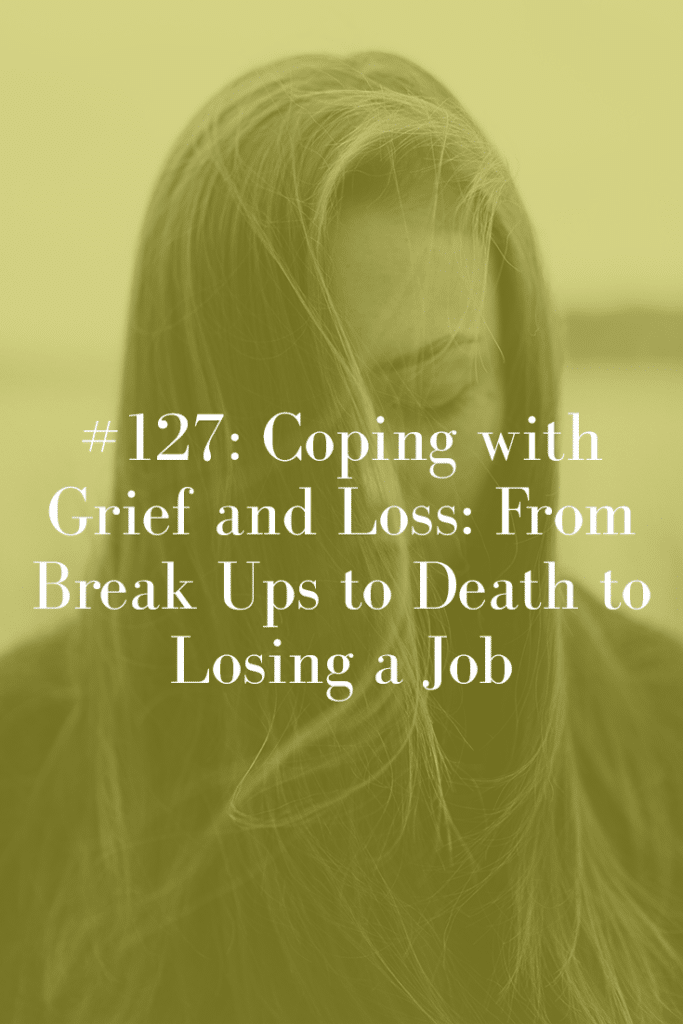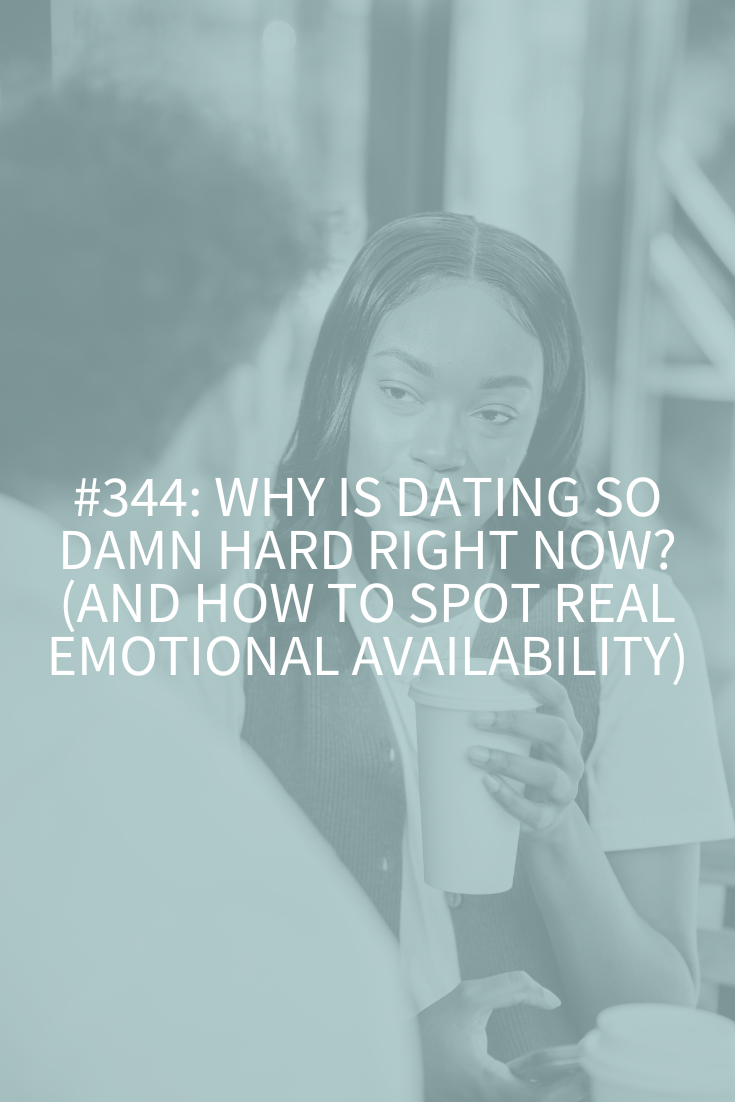
Grief and loss aren’t just about someone dying. Sometimes you’ll experience these feelings due to something out of your control like being fired or someone breaking up with you. And you can feel grief and loss even when you were the one in control! You might have voluntarily moved, been the one doing the breaking up, or maybe you decided to stop drinking – but you can still experience these same feelings of heartache, anguish and misery.
Today I’m going to teach you how to know if you’re stuck in a grief process (and maybe don’t even realize it), my different take on those famous stages of grief and my top tips for coping whether you’ve been betrayed, lost a job, had someone die or moved to a new home! And, as a special bonus, I’ve got my FREE tips for Helping Someone Else Through the Grieving Process!
Getting Stuck in Grief and Loss
Before we jump into the “what,” we need to spend a minute on where you are now. Many times, people don’t realize that they’re a little stuck in grief or loss and haven’t even identified that that’s what’s happening!
If you’ve had a loss, and it was awhile ago (more than six months), these are some signs you might be stuck in your process:
- Anger: consistent angry outbursts or just a general angry demeanor about things and people
- Impatience: a generally impatient manner with everyone and everything
- Using: If your use of drugs, alcohol, food or sex has increased and has stayed increased, you might be in a stuck place
- Never being satisfied and needing the next and the next. Feeling real unhappiness in your moments and nothing really being good enough.
- I should have/regrets
- Ongoing difficulty with sleep or changes in appetite
- Increased and persistent fatigue
Now let’s talk about those 5 stages and how they might look with different types of losses:
1. Denial
Here’s one of those stages you might never be in. In my experience, denial happens more commonly if something happens suddenly (or relatively suddenly). If you’re in this stage you might feel confusion, shock, fear and a strong desire to avoid any and everything having to do with the event/person. Your life, as you knew it, has changed and can never be the same and you’re reeling on some level.
2. Anger
This stage is often marked by being easily irritated, anxious, frustrated or resentful (as well as good old-fashioned pissed-off-ness!). Anger is often misdirected (telling off your wife after you’ve been fired) and you’re likely playing the blame game. You also might be thinking how unfair it all is! Why does this stuff always happen to me?!
Anger is healthy as a stage of grief. It’s when it takes over your life and changes your personality that over a long period of time that it can become a “stuck” point.
3. Bargaining
I think of this as the guilt stage. “If only I’d x, then this wouldn’t have happened.” It’s usually followed by even staunch atheists saying something like, “God, if you get me my job back, I’ll be so grateful every day of work and do an amazing job!”
This is when you’re willing to make a very major life change in order to change the story of what’s happening. You also might be stuck in the “what ifs” or “if onlys”. “If only I’d never given him that motorcycle, he wouldn’t have gotten in that crash.” “What if I’d said I love you more, she never would have left! Again, the guilt can be very heavy here.
Really what you’re doing is trying to find a way to gain some control and not feel so vulnerable and afraid.
4. Depression
Lots of people think this stage is mandatory and it’s not. Loss can be very complicated and confusing. Maybe you’ve moved to a new town and you’re really excited about it. You love your new home and job but you still might be feeling loss over the home you left! It doesn’t mean you have to be depressed about it to still be in a stage of grief.
For others, depression is definitely a big player. Something important to remember is that depression doesn’t just look like being sad and not being able to get out of bed. It can also show up as hostility or anger, confusion, overwhelm, numbness, disconnection and not being able to keep track of things well (seeming “flighty”). Obviously, depression can also show up as suicidal thoughts, “Why go on?”
5. Acceptance
This could also be called the moving on or hope stage of grief. At this point, it’s not about, “Oh, it’s great that I got fired.” But, it’s “I got fired, but I’ll be able to find a new job.”
This is a time of exploring new options and taking different action. Many of my clients describe it as a feeling of “coming back to reality” or “coming out of the fog” and finding new strength for creating the next thing. It’s not about thinking what happened is a good thing (although that can happen) but actually feeling like it’s here and I’m going to move past it now.
Tips for Coping with Grief and Loss:
1. Develop New Rituals. Whatever rituals you had around the thing you lost need to be updated. If you and your ex used to go out for a date night every Saturday, don’t stay home thinking about what you lost! Do something new on Saturday night that feels good to you.
2. Get Thee to Support. Let people know you need to talk about what’s going on. Talk openly to friends or family but talk about those feelings! If you’re worried about bugging people or like you shouldn’t be grieving anymore, find a therapist or support group.
3. Change as Little as Possible. Don’t go on a new diet, move homes, and start that boot camp all at the same time. Grieving (even if it’s for someone you lost long ago or a long-ago breakup) takes a lot of mental bandwidth so you need all of it (or as much as possible) to deal with your feelings. I know you have more time in your day, but do you have “mind” in your day. Give yourself room to have these feelings.
4. Be Kind to Yourself. Find that self-compassion and be as kind and patient with yourself as possible. Try to stick to a schedule and keep a routine. Go to bed and wake up at the same time each day. Exercise, eat well, limit drugs and alcohol, connect with others…you get the picture.
5. Keep the Relationship Going. If someone dies, I often encourage clients to keep that relationship going. You’re still in a relationship, you just can’t see the other person. Put out pictures of yourself with them. Speak to them daily. Talk to your kids or others about them. Figure out ways to incorporate a lost loved one into your current life – let them get to know you now!
6. Explore the Hurt. Yes, it sounds like it sucks, but having an imagined conversation with your ex, dead mom or old boss to explore an unresolved issue or resentment can be very helpful!
7. Move from why to how. In the end, you want to move from why did this happen to how can I move forward? What can I do today, right now, to feel or think differently? Not why did this happen, but how can I move forward now? What can I take with me (if appropriate) from that person, relationship or job to give meaning and use that meaning to inform next steps? This could be having a morning conversation with your dead spouse to doing a daily morning kindness meditation where you send loving thoughts to your old boss.
Resources and Links:












